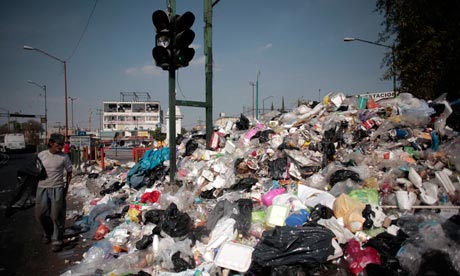The closure of Mexico's biggest garbage dump has highlighted the absence of a comprehensive policy for urban waste collection, disposal and processing, a failure that has serious consequences for health and the environment.
The leftwing government of the Mexican capital decided in December to close Bordo Poniente, the biggest refuse dump, located in the east of the city, without coming up with an alternative solution. Now municipalities adjacent to Mexico City are refusing to accept its waste.
"We have insisted on the 'metropolitanisation' of public services, like waste collection, water, transport and energy which are in crisis situation now. A fair amount of Mexico City's waste comes from people who live in the metropolitan area - people who come in to the city to work, and the informal traders," Iván Restrepo, head of the Ecology and Development Centre, told IPS.
Restrepo and his team have monitored the garbage situation in this Latin American country since the 1980s.
The Bordo Poniente landfill site has been in use since 1985. It covers an area of 600 hectares and was receiving 12,600 tonnes of waste a day, 7,000 of them from municipalities in the state of Mexico, adjacent to the Federal District (DF) or city proper, according to the capital city's secretariat of works and services.
Moreover, 70 million tonnes of waste are buried underground at the dump, causing serious water and air pollution problems.
The closure of Bordo Poniente has sparked a conflict between the national, city and state governments: the national government has been exerting pressure since 2008 to close the site, but the Mexico City government kept it going until 2011, while the state of Mexico government is resisting the location of garbage dumps in its territory.
Only as the new year began did the federal and city authorities reach agreement about the definitive closure programme, which provides for the Mexico City government to put the exploitation of methane, produced by waste decomposition at the site, out to international tender.
The crisis became acute as "more urban areas became densely populated, so that waste was further concentrated," said Ramón Ojeda, secretary-general of the International Court of Environmental Arbitration and Conciliation (ICEAC). "Consumerism has increased sharply, in tandem with the absence of a culture of non-generation, classification and recycling of waste," he told IPS.
In 2008 ICEAC, based in the Spanish city of San Sebastián, recommended the closure of Bordo Poniente, restoration to compensate for environmental damage, and the investment of 71 million dollars in cleaning up the site.
ICEAC was created in Mexico in 1994 with the aim of resolving environmental conflicts by negotiation between states, individuals and legally recognised bodies such as companies and NGOs.
Mexico's ministry of the environment and natural resources estimates 40 million tonnes of garbage are generated annually in the country, of which only 15 percent is recycled.
"We are tossing valuable materials into the trash, and there is the whole problem of the absence of re-use and recycling. The goal is to recycle at least 60 percent of our waste. We must establish sanitary landfills that meet health and safety regulations. You can't just improvise a landfill site," said Restrepo.
"We are going to have a problem with garbage for a long time. If we take action now, it need not get any worse, but we need a long-term strategy," he said.
The Ecology and Development Centre identified at least 30 failed garbage dump projects since the 1980s. The failures were due to a mix of several factors, such as corruption and the lack of political will.
The metropolitan area of Mexico City, home to some 24 million people, has only two garbage dumps in the state of Mexico, and they are in danger of overflowing now that Bordo Poniente is closed.
The landfill has ceased to receive 3,600 tonnes of garbage a day, while 3,000 tonnes are going to make compost, 800 tonnes of plastic bottles, cardboard and metals are being recycled, and 600 tonnes are used to produce alternative fuels, according to the ministry of works and services.
That still leaves 4,600 tonnes a day without a designated purpose.
In 2009, the Mexican federal government suspended plans for building Centros Integrales de Reciclado y Energía (CIRE - Integral Waste-to-Energy Plants) because of heated opposition from local residents in the locations chosen. The CIREs are intended to make use of organic waste to produce compost, recycle inorganic materials and generate electricity.
The 2003 Federal Waste Law regulates waste management and procedures for opening and closing waste dumps, but does not clarify who owns the garbage - the source producer, the collector or the waste dump manager? - until such time as it reaches the hands of the municipal or federal authorities, which complicates the use of garbage for profit.
"We are facing environmental and regulatory chaos. Powers vested in the authorities should be turned over to ordinary citizens, without any privatisation of waste management services, so that we can have an organisation with broad representation, including experts, universities, citizens and private companies," said Ojeda, whose term as head of ICEAC is due to end in 2013.












Comments
Sign in to comment or to join the conversation
9 January 2012 1:23PM
we must begin to see our economies as energy systems. so much energy is stored in that rubbish, so much energy wasted cos it cannot be turned to money to feed the greed of a tiny few.
9 January 2012 2:33PM
So... what is going to happen to the rubbish?
9 January 2012 2:45PM
This comment was removed by a moderator because it didn't abide by our community standards. Replies may also be deleted. For more detail see our FAQs.
9 January 2012 2:52PM
consumption & waste is so out of control that it surprises me more cities do not suffocate on their own sh*t & vomit
9 January 2012 2:58PM
Why not burn it? To generate electricity (instead of coal).
9 January 2012 3:22PM
It doesn't make me want to rush off to Mexico City on holiday. Wasn't there an article a while ago about the water table falling beyond sustainable levels? There doesn't seem to be the Political will to do anything about it as the city chokes on its own refuse and excrement and dies of thirst.
9 January 2012 3:23PM
Ship it over to China....there are billions over there who will sort it out in a flash..
9 January 2012 3:25PM
Article missing assertion that the USA is completely to blame for this.
Journalist network needs more training...
9 January 2012 3:31PM
Can't understand why they can't get organized and just get it sorted... the figures mentioned are staggering. I agree with arabeska.
9 January 2012 3:59PM
Incidentally, I would say Mexico City is one of the most wonderful cities I've ever been to. Astonishing place.
9 January 2012 4:02PM
This comment was removed by a moderator because it didn't abide by our community standards. Replies may also be deleted. For more detail see our FAQs.
9 January 2012 4:09PM
I believe Philadelphia has been sending it's waste there for years.
9 January 2012 4:31PM
What's your source?
According to:
http://www.zerowasteamerica.org/index.html
America imports more waste, particularly toxic material, from Mexico than is exported back, but then it's an American website.
9 January 2012 4:57PM
Memory ? Reading something a while back ?
9 January 2012 5:51PM
"The leftwing government of the Mexican capital decided in December to close Bordo Poniente, the biggest refuse dump, located in the east of the city, without coming up with an alternative solution. "
This is so unlike the left. Not.
9 January 2012 7:05PM
It's a very typical conundrum which is found on a smaller scale in many local authorities. At least they are bringing the problem to a head. You don't have to be on the left to admit that as a species we waste our resources unnecessarily. I think if we closed some of our own landfills we might be better motivated to improve our recycling percentages.
9 January 2012 7:08PM
Why should the Mexico government care?
Sanitation doesn't contribute to GDP figures after all.
9 January 2012 8:16PM
This wouldn't happen in Britain, we would have brought in a Tax.
That would have sorted it.
9 January 2012 9:25PM
surely they can just dig a big hole, the spoil from that can then be placed in another big hole and then the spoil from that can be sent to the moon - I hear it has plenty of largish craters.
10 January 2012 2:49AM
Not only energy but energy and also materials systems - like ecosystems its not only about energy. Further to this:
1. Theory and technology for recycling materials and extracting energy is already well advanced though from what I've seen things arent that well developed in most parts of the UK. So there are already solutions. They are not perfect but thjey are still pretty good.
2. The first problem/why this is not well done - is poor internalising the costs so when you buy anything moneys are also extracted to recycle or otherwise use the plastics, paper etc. Economist play with this idea but seldom discuss the failings of market strategies. Its just like the carbon dioxide mess. Some governments have introduced environmental levies with more reuse/recycle in mind but too often their Treasuries see these funds as honey pots which they can divert after the honeymoon is over to other uses.
3. Beyond/on top of this there there is the need to:
a. Reduce consumption generally beyond that dictated economically (retailers dont want to include the cost of reuse in their products).
b. Move to sustainable materials beyond mere tokenism (reducing plastic bag use when transporting vbast quantities of packaging - like from a few UK grocer chains I can think of.
c. Stop overconsumption of the stupidest kind - like throwing out excess food then buying in 'fresh' packaged bubble and squeak.
4. One of the most laughable aspects of the so called tiger economies which Mexico is sort of a member of - is that by in large their environmental/ecological losses are not yet internalised. So be wary before you invest too much in China, India et al. or suggest sending your (electronics) rubbish there. To a small extent they recycle material but only at huge human cost (reliance on the dirt poor working in dangerous conditions) and very incompletely (think carbon emissions from same countries who seem to want to repeat the same dumb natural resource exploitation mistakes and waste generation as our societies have in the past and to a degree continue with - at least we are avoiding high sulphur coal for the moment).